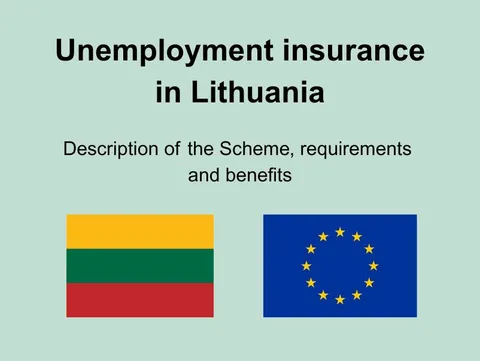EU
Lithuania
Unemployment
Insurance
Unemployment Insurance in EU->Lithuania
Unemployment insurance in Lithuania
This article provides current information on unemployment benefit, procedures for claiming it and the requirements for eligibility.
In what situation can I claim?
Unemployment insurance is compulsory for all in employment. Benefits are linked to earnings prior to becoming unemployed and to the minimum monthly wage approved by the Government.
In order to qualify for unemployment insurance benefit (nedarbo draudimo išmoka), a person is required to have been insured for at least 12 months in the last 30 months prior to signing on at the Employment Service.
If insurance contributions were paid for you, but they have not been paid for the required length of time (if, for example, you have completed compulsory military service), you may be treated as an exception. The unemployment benefit is granted as of the eighth day after acquiring unemployment status. If you were dismissed through your own fault, the waiting period will be 3 months.
Unemployment insurance benefit will cease to be paid from the date you find work or become self-employed.
What conditions do I need to meet?
You have unemployment insurance if:
- you are employed under an employment contract, an authorship contract or a patent agreement, including in positions to which you were elected, or you are politician or public official, and you receive wages according to special laws
- you are in the National Defence system professional military service, a volunteer soldier, on other active service, or a managed reserve soldier called up for exercise, training or to perform service tasks
- you are in the Lithuanian armed forces, in the initial compulsory military service or undertaking alternative service
- you are not working because of taking childcare leave to look after 1-3 years old child
- you are one of the parents (or adoptive parents) of a disabled person or the guardian (carer) of a disabled person, providing permanent care at home
- you are the spouse of a posted civil servant or of someone in the professional military service and living together abroad
- you are an Internal Service officer
- you are the owner of an individual company, member of a small partnership or member of the partnership and generate income
- you are a working student in full-time education
If you wish to receive unemployment benefit you must fulfil the following conditions:
- you must be unemployed
- you must be of working age
- you must not be in general education programme, except for persons who study according to adult primary, basic, secondary education programs
- you must be able to provide proof of having achieved the minimum period of unemployment insurance
- you must be registered with the Employment Service
- you must be actively seeking work, prepared to accept jobs offered to you, and actively participate in labour market policy measures (see Jargon busters below)
- you must not be in receipt of sickness or maternity (paternity) benefits or other social security benefits
You will not receive unemployment benefit if you:
- are studying under a general education programme
- have reached the statutory old-age pension age or are recognised as being incapable of work
- have missed, without a valid reason, an appointment at the Employment Service for accepting a job offer, or for drawing up of an individual plan on employment activities, or for participating in the active labour market policy measures included in the individual plan on employment activities or programmes on increasing employment, or for using the labour market services provided in such plan
- have refused, without a valid reason, to accept an individual plan of employment activities or to participate in the active labour market measures provided in such plan, or have refused a suitable job for the second time within a period of 12 months; have stopped participating in the learning support measures or supported employment measures without a valid reason
- have not sought, without a valid reason, a job and have not carried out activities of providing agricultural and forestry services validated by a receipt and/or violated the procedure for reporting on individual job search for the second time during the period of 6 months after the first report
- have received income illegally
- your permit entitling you to reside in Lithuania as unemployed has expired
- a court decision, order or judgment has imposed penalties, or sanctions on you
- you migrate from Lithuania
- you have filed an application cancelling registration with the of Employment Service
- were recognised by the Employment Service as a person getting ready for the labour market
You will avoid sanctions if you can prove valid reason for any of the above (illness, accident, death of a parent, child or spouse, etc.).
The unemployment insurance benefit shall be paid for 9 months.
In the case you have less than 5 years remaining until retirement age when the period of benefit payment comes to an end, payments may be extended by a further 2 months so long as you are not in receipt of an early old-age pension.
If you have more than 30 years of insurance contributions and you will receive a retirement pension within the coming 5 years, you may apply for early payment of your pension.
What am I entitled to and how can I claim?
Unemployment benefit is calculated as the sum of a fixed part and a variable part. The fixed part equals the 23.27% of the Minimum monthly wage and now it is EUR 215.01.
The variable part of the benefit is 38.79% of the average monthly insured income of the unemployed for the first 3 months; 31.03% for the next 3 months and 23.27% for the following 3 months. The average monthly insured income of the unemployed is calculated taking into account the amount of every month during the previous 30 months starting two months preceding to the date of the acquired unemployment status.
Unemployment benefit cannot be less than 23.27% of the minimum monthly wage and cannot exceed 58.18% of the average national wage.
Applications for payments should be addressed to the Employment Service or SoDra.
Jargon busters
- Active labour market policy measures include Support for learning - vocational training, employment under an apprenticeship employment contract, internship (traineeship), recognition of competences acquired by non-formal and informal learning, non-formal adult education, acquisition of qualifications and competences of high added value.
- Supported employment - subsidised employment subsidy for the cost of a job assistant.
- Support for job creation or adaptation - subsidising of job adaptation, implementation of local employment initiative projects, support for business creation.
- Support for mobility Employment Service - the main institution for the employment, retraining and active labour market policies.
- SoDra - The State Social Insurance Fund Board under the Ministry of Social Security and Labour, the main institution organising social security.
- Minimum required insurance period - the period for which the payment of insurance contributions is required in order to qualify for unemployment benefit (12 months in the previous 30 months prior acquired unemployment status, though there are exceptions as indicated above.
Forms you may need to fill in
You may sign on at local SoDra office or at the Employment Service or online.
Know your rights
These links will help you find out what your rights are.
- Employment Service: information about unemployment benefit
- https://uzt.lt/darbo-ieskantiems/45
- SoDra: payment of unemployment benefit
Who do you need to contact?
Lithuanian Employment Service: +370 70055166.
Regional Employment Service branches.
This page was last updated in 2024.
- Unemployment insurance in Europe →
Unemployment Insurance in Lithuania
You might also be interested in:
⇒EU social security coordination
⇒Unemployment Insurance in the Nordic countries
Key points of EU Unemployment Insurance coordination
- Transferring periods of work and insurance between EEA countries As an EU citizen you can transfer acquired rights from Unemployment Insurance when moving between EU/EEA contries. In this way it may be easier to become entitled to unemployment benefit in the country you move to.
In the vast majority of the Member states the aggregation rule become fully applicable as soon as you starts to work in the country. However in Denmark, Belgium and Finland you must work some period there before you can use the aggregation rule.
You need a PD U1 document in the country you leave or if the involved countries use electronically exhange (EESSI) there will be issued a SED U002. The countries who issues the highest number of PD U1 documents are Germany, Austria, Switzerland and the Netherlands. The countries who receives most PD U1 documents are Lithuania and Italy. - Transferring unemployment benefits Under certain conditions you can go to another EU country to look for work and continue to receive your unemployment benefits from the country where you became unemployed. The period you can export your unemployment benefits varies from 3 to 6 months in the different Member states.
You have to apply for a PD U2 document in the country you leave, or if you haven't done that the institution in the receiving country must request a SED U008 from the competent institution in your last country.
The countries who issues the highest number of PD U2 documents are Germany, Switzerland, the Netherlands and Denmark. Poland is the country who receives by far most PD U2 documents. - Unemployment benefits coverage According to OECD the net replacement of income after 2 months of unemployment, for a single person without children whose previous in-work earnings were 67% of the average wage varies from 33 percent (Ireland) to 91 percent (Belgium). Read more here..
- Having residence in another EU country than where you work? According to EU social security coordination rules you must only be insured against unemployment in one country at a time. As a generel rule this country is where you work.
In Member states who have compulsory insurance, you will automatically be covered when you start working there.
However you may be insured by your country of residence if you are posted to a EU/EEA country or work in two or more EU/EEA countries at a time. In these situations you can not your self decide where to have unemployment Insurance, but you (or your employer) must apply for a PD A1 document which states in which country you are covered by social security, including Unemployment Insurance. Special rule also apply for cross-border workers ("frontier workers"). - Third-country Nationals working in EU/EEANON-EEA citizens are covered by Unemployment Insurance in the EU countries who have compulsory Unemployment Insurance. In countries with voluntary Unemployment Insurance (Denmark, Sweden and Finland) third-country nationals can become member of an Unemployment Insurance Fund.
In the most countries Third-country nationals can also use the EU Coordination rules when moving within EU/EEA (however not in Denmark, Iceland, Liechtenstein, Norway and Switzerland).
Third-country nationals in short-tem working relations often faces problems with actually get Unemployment benefits, even though they have contributed to the system. This is due to the fact that one normally need a residence permit which allow one to take any job, and also because of a qualifying period in most countries between 6-12 months.

